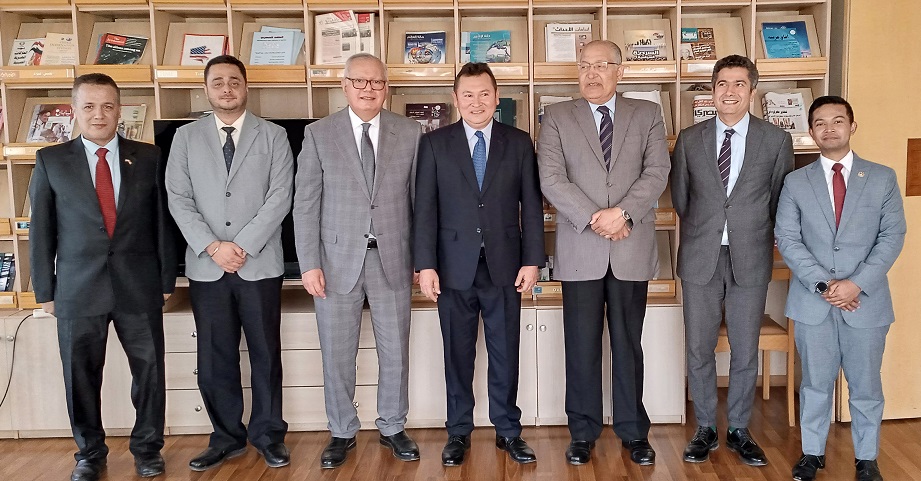• In The Symposium of Sino-African Cooperation…And Communication Among Peoples
April 10, 2019Dialogue with The Ambassador of Ireland to Egypt
April 16, 2019
On April 15, 2019 at the Council’s headquarters, Ambassador Dr. Mounir Zahran, President of the Council, received: Dr. Ayman Khalil, Director of the Arab Institute for Security Studies in Amman, Jordan, and Mr. Samuel Hickey, a researcher at the Institute, at his request, to shed light on the study prepared by the latter on the Egyptian-Russian agreement to establish the Dabaa nuclear plant.
-
Mr. Hickey began to review the study that takes as states (Middle East +) as the International Atomic Energy Agency (IAEA) calls it, where the definition includes the Arab League in addition to Iran and Israel, as well as turkey, especially since it has a strong relationship with Russia in the nuclear file, and the study shows how these countries usually rely on foreign aid and investment in light of the limited resources, which requires cooperation with major countries in the nuclear field, whether in the provision of financial or technical resources, which represents a threat and a burden. on the economy of those countries.
-
The analysis includes the division of states into a end user comprising a number of Middle Eastern countries, namely Egypt, Jordan, Turkey, the United Arab Emirates, Saudi Arabia and Iran, which have entered into negotiations to establish reactors for peaceful use of nuclear energy or divert some of them from military nuclear production and enrichment for peaceful uses — the case of Iran — as opposed to six major nuclear-exporting countries competing with each other on the Middle East market (where they see it as a nuclear market), namely Russia, China, the United States, France and South Korea. Japan, bearing in mind that Russia enjoys the lion’s share of this market.
-
The study also reviewed a number of factors that influenced their vision of having nuclear reactors for peaceful uses and their vision of how they imported such technology, whether the global financial crisis of 2008 as well as the Arab Spring, or even the current and future generations of these reactors by resorting to a technological revolution that enhances the security and security of those reactors, especially after the Fukushima reactor accident in Japan in 2011.
-
The study focused on the economic and financial aspects of the establishment of nuclear reactors, reviewing three main models of financing for those reactors, either relying on government funding or allocating a single budget for the project or through financing programs, but with the high cost of constructing these reactors, many countries resort to relying on financing programs, which also include government funding. In terms of ownership, these projects may be through partnership with the private sector or the operating and land ownership system, and the state is the owner, hence iran’s financing depends on the development of a budget allocated to the project, 80% of which is paid in cash and 20% provided as a share in kind, and the state owns the establishment and industry. Egypt relied on government financing, sovereign debt and the country’s owner ship. Saudi Arabia and the UAE rely on financing programs to partner with the private sector and the government has the largest share and employment eligibility, which is the same with Jordan and Turkey.
-
The study was subjected to some questions about the Egyptian-Russian deal to establish the Dabaa nuclear plant, especially since it is financed by the Russian government and a grace period for six years, as well as payment of installments through revenues from energy production, and with the least benefit while the deal was not provided by Russia to Jordan, although this is mainly due to political aspects and a Russian desire to strengthen its presence in Egypt, especially since it enjoys stability in the troubled Middle East region, and with increasing burdens and costs due to its intervention in the region and specifically in Syria, Russia wants more engagement and burdens, so the offer was to provide a commercial loan to Jordan to end up with Jordan’s current attempts to evaluate the models and offers offered to it by China and Russia, and Jordan ended up negotiating with China as an alternative to Russia.
-
Commenting on the above, the President of the Council stressed the importance of what was addressed in the study, noting that it did not include the technical aspects and is limited to economic aspects, especially since there are global competitions between the major countries that own this technology.
-
Dr. Ayman Khalil proposed to hold a joint seminar between the Council as well as the Arab Institute for Security Studies either in Cairo or Amman as agreed, to discuss the study in all its aspects, and the Chairman of the Board promised to submit the proposal to the Board of Directors.






